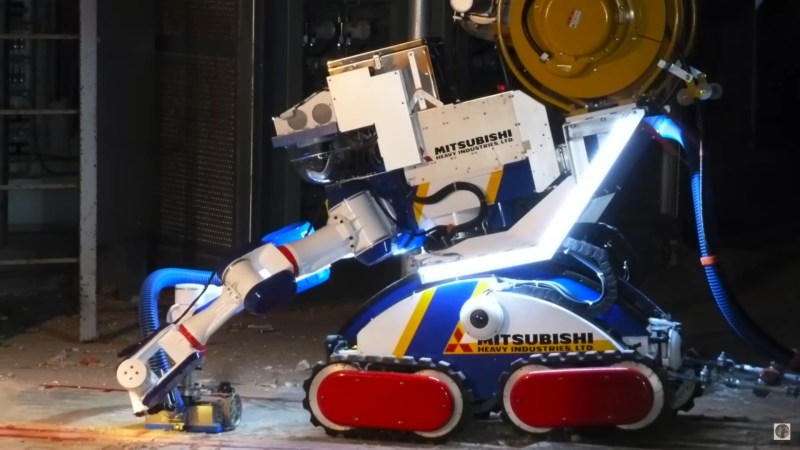The idea of sending robots into conditions that humans would not survive is a very old concept. Robots don’t heed oxygen, food, or any other myriad of human requirements. They can also be treated as disposable, and they can also be radiation hardened, and they can physically fit into small spaces. And if you just happen to be the owner of a nuclear power plant that’s had multiple meltdowns, you need robots. A lot of them. And [Asianometry] has provided an excellent synopsis of the Robots of Fukushima in the video below the break.
Starting with robots developed for the Three Mile Island incident and then Chernobyl, [Asianometry] goes into the technology and even the politics behind getting robots on the scene, and the crossover between robots destined for space and war, and those destined for cleaning up after a meltdown.
The video goes further into the challenges of putting a robot into a high radiation environment. Also interesting is the state of readiness, or rather the lack thereof, that prompted further domestic innovation.
Obviously, cleaning up a melted down reactor requires highly specialized robots. What’s more, robots that worked on one reactor didn’t work on others, creating the need for yet more custom built machines. The video discusses each, and even touches on future robots that will be needed to fully decommission the Fukushima facility.
For another look at some of the early robots put to work, check out the post “The Fukushima Robot Diaries” which we published over a decade ago.
















Difficult environment to work in. Sounds like a better frontier than going to mars.
Btw: nucleair proponents not home right now? What a pity…
Meanwhile the opponents can’t spell nuclear. Lovely.
Every machine has compromises. Every energetic apparatus involves risk.
I may disagree with the location of the reactor in question, but that doesn’t mean the technology is fundamentally flawed.
That is true. Nothing wrong with that. It’s just i dont trust monkeys, ehh humans with it. Risk in this case should be spelled RISKS.
But thank you for popping up. One proponent is better than no one.
I’m sorry, but…
https://www.angryflower.com/247.html
And here I thought you were leaving that because of my last name. But no… I somehow let “robot’s” slip through, which is clearly the misuse of an apostrophe. And to be fair to myself, and to inform the average Hackaday reader that Hackaday contributors are not imbeciles, I do know that the use was wrong. But in an earlier version of that sentence, it might have been right. And when one is editing their own work when bleary eyed, stuff can get missed. And editors are also humans.
Pretty soon, ChatGPT will take my job give it to a bunch of simulated neurons (or something like that) and then we’ll have factually incorrect summarizations of twitter and reddit posts. But they’ll at least be grammatically correct.
“And here I thought you were leaving that because of my last name.
And to be fair to myself, and to inform the average Hackaday reader that Hackaday contributors are not imbeciles[…]
And when one is editing their own work when bleary eyed, stuff can get missed.
And editors are also humans.
But they’ll at least be grammatically correct.”
Ooh! A ‘but’… >.<
(You do like to begin a sentence with a conjunction, huh? =] )
For nuclear-tolerant robotics, there should at least be an honourable mention for the ODEX-1 and the fantastically beefy-looking ODEX-3 : http://cyberneticzoo.com/walking-machines/1983-odex-1-functionoid-walking-robot-american/
Nice
“and they can also be radiation hardened,
and they can physically fit into small spaces.
And if you just happen to be the owner of a nuclear power plant that’s had multiple meltdowns, you need robots. A lot of them.
And [Asianometry] has provided an excellent synopsis of the Robots of Fukushima in the video below the break.
and then Chernobyl, [Asianometry] goes into the technology
and even the politics behind getting robots on the scene,
and the crossover between robots destined for space and war,
and those destined for cleaning up after a meltdown.”
And..? =]